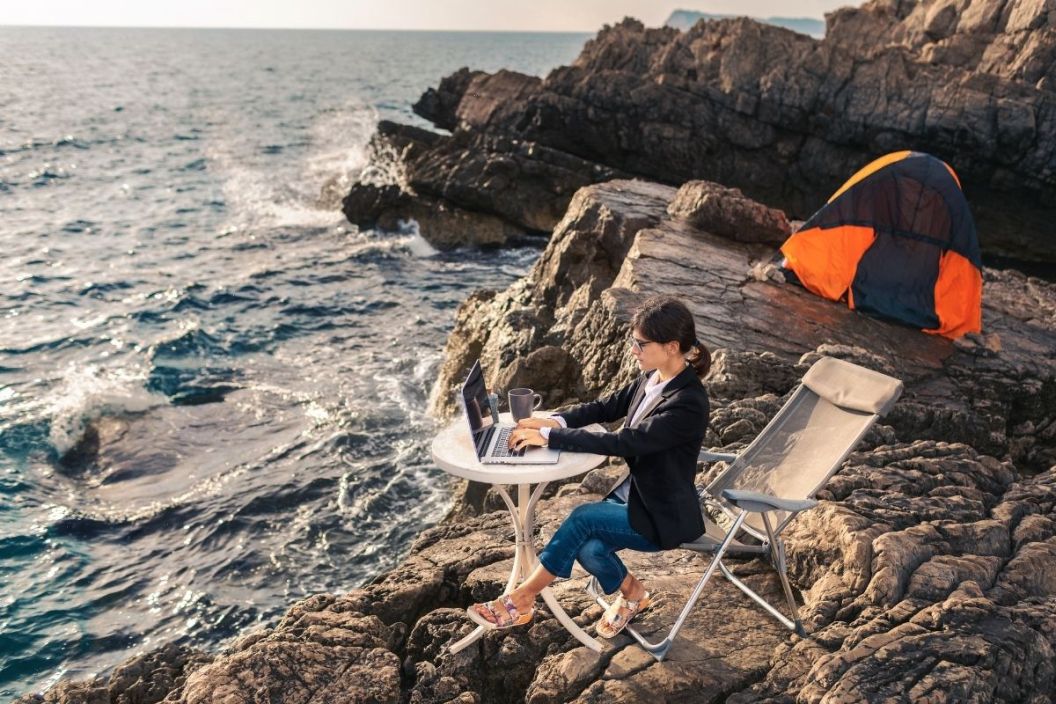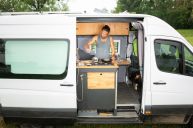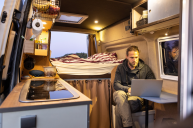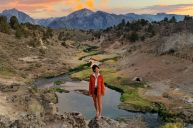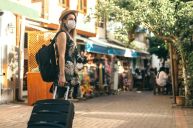The term "digital nomad" has found its way into more and more conversations over the past few years, and there's a good chance you've googled the term yourself. The pandemic basically forced companies to reconfigure their entire work structure in order to keep up with the rapidly changing restrictions, and in turn, that allowed employees to restructure the way they work and the places they work from. If you had been given the option to work from anywhere in the world, wouldn't you take the opportunity?
Imagine traveling through different time zones, combining a life abundant in adventure with a well-balanced and structured workflow, while at the same time being able to maintain a sustainable and healthy lifestyle. Sounds too good to be true? Well, it's totally possible! Luckily for us, it's also becoming easier to make this dream a reality as companies recognize this sudden shift in workflow. New co-living hubs and co-working cafes are popping up in nomadic hotspots across both the United States and foreign countries like Thailand and Colombia, providing a safe place to crush your work goals before the sunset surf session begins.
What It Takes to Become a Digital Nomad
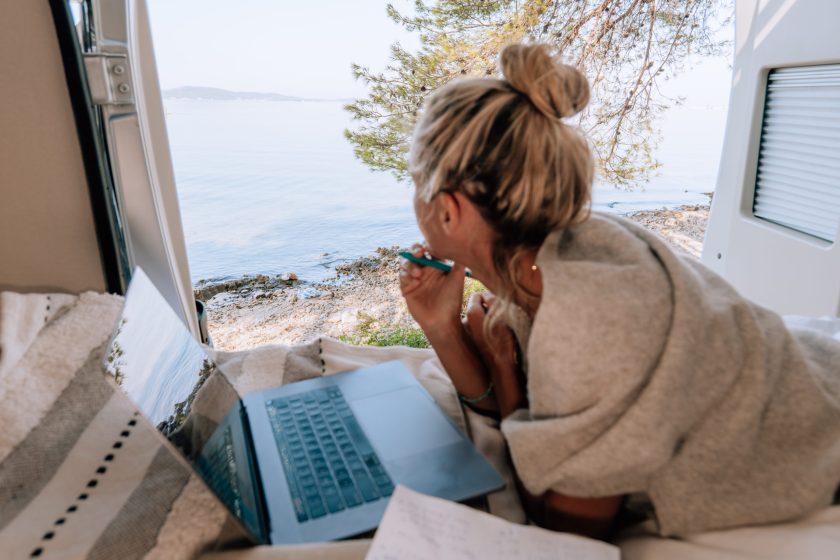
Mystockimages via Getty Images
"Where do I begin?" is what you may be asking yourself, and that answer largely depends on the way you want to live. The journey for everyone is very different as you'll soon read below, but most have a few things in common: a solid internet connection, the desire to travel to different locations, and a strong work ethic. Does that sound like you?
Virtual assistants are becoming more popular, some folks are self-employed running startups from a coffee shop in Argentina, while others have online businesses earning passive income from their smartphones. The options are virtually endless! Part-time and full-time remote workers are in high demand right now and the perks are truly endless for those wishing to make the transition into a digital nomad life. As you know, with every new and valuable experience, it's going to take patience, adaptability, and persistence in order to craft the life you've been dreaming of. If this is your first time looking into a remote job or if you have read extensively about remote work before, with a bit of advice from our digital nomad community, taking your first step may not be so difficult.
The Nomad Interviews
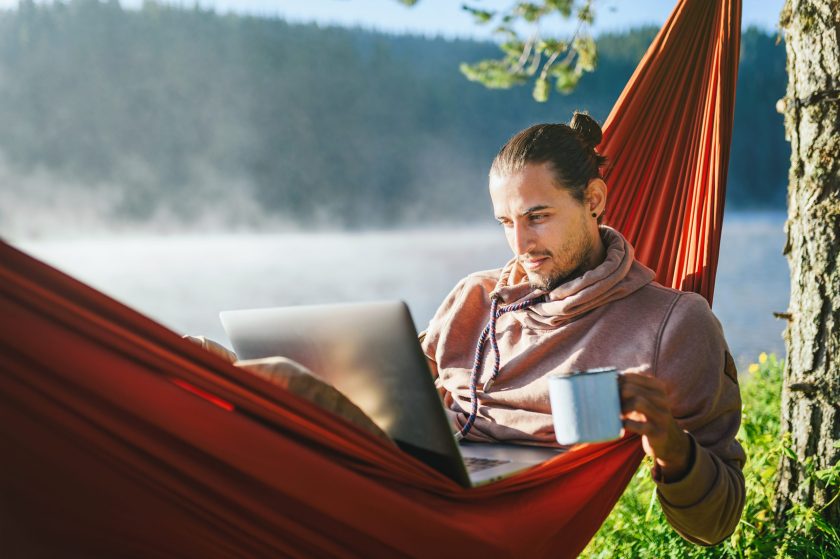
Vasil Dimitrov via Getty Images
Jess Shisler, Ph.D.
2017 Mercedes Sprinter Van, 4x4, high roof on a 144" wheelbase
How long have you been traveling?
Travel has always been a big part of my life, as it's a value that my parents instilled in me at an early age. I bought my first cargo sprinter van in 2016, built it into a tiny home with my husband, quit my job, rented out our house, and became a full-time nomad in April 2017.
What do you do for work?
I am the co-founder and COO of S?"kr, a crowdsourced mobile app making outdoor travel easier, safer, and more connected. My day-to-day includes a lot of zoom meetings, traveling to community gatherings and outdoor travel expos, and managing our fully remote team of 12 employees.
Why did you choose a life on the road, was your transition to the digital nomad lifestyle gradual or was there an event that made you change everything?
In 2016, we were living in Baltimore, MD, and I was commuting four hours a day to DC or NYC for my science communications job. My husband, Mike Shisler (@drawn.there), and I took a week off work for Burning Man but didn't get tickets, so we took a five-day backcountry hike in the Tetons instead. On that trip, we saw our first camper van. There weren't many camper vans on the east coast at the time, and this thing got me thinking about living smaller, more intentionally. So as we hiked, with no internet or devices, we reflected on how much joy we were experiencing with just the essentials on our backs, dirt in our nails, and the trail beneath our feet. What if we could live every day with that intentionality? What if we considered a van payment the same as a mortgage payment? When we returned home, we bought our first cargo van and started turning it into a tiny home on nights and weekends. Living in the city meant we had to rent a parking space at a storage unit, and we built the van in that parking lot with battery-operated tools. Over the next six months, we quit our jobs, rented out our house, and started planning our one-year road trip! My mantra during that scary time was, "Leap and the net will appear." Our family thought we were crazy for leaving our careers behind, but we knew life was too short to be unhappy. Needless to say, we never went back to those jobs, and five years later, we are still living in a van!
Have you experienced any downsides to being a digital nomad and how have you eliminated or minimized them?
Absolutely there are downsides to being a digital nomad. It's not always the beauty you see on social media. First off is cell service. I have to find campsites with a signal or else I can't stay there long. I can't count the number of times that I drove hours down a dirt road with the promise of service only to have to turn around and stay at a rest stop or Walmart closer to the highway for a signal. I built the S?"kr app to help mitigate this struggle for myself and other digital nomads. We have cell service map overlays and member-reported signals at campsites so you know in advance what to expect.
The second pain point is community connection. As a former aging researcher at NIH, I know the number one factor associated with longevity and health span is feeling a sense of belonging. That's something that nomads don't have. There's always a lingering feeling that we don't belong anywhere. You shouldn't have to lose your community just because you chase your dreams of travel, so I built community features into the S?"kr app, like finding nearby people, messaging, and an events calendar. There are so many of us out there, and we just needed a platform to find each other in real time to facilitate that immediate need for personal connection.
What do you wish you would have known before becoming a digital nomad?
I wish I knew there were others like me! The world is a different place now than it was when we hit the road in 2017, and I'm so grateful for the friends we have made along the way.
What is one piece of advice you would give to someone considering becoming a digital nomad?
Chase your dream, do the thing that scares you. The worst outcome is that you fail, or find out it's not what you thought it would be. There's no reason to ever say "you're living my dream" because you are the only thing in the way of making your dreams come true. I recognize there are societal realities that make it more difficult for POC or other marginalized identities to travel this way, but you will find your people and your places if you're looking.
Is there anything we missed that you would like to share with our readers?
Being a digital nomad is not as easy or as glamorous as it looks on social media, but the discomfort gives you location independence. It's up to you if that discomfort is worth it. Traveling full time is not a vacation, regardless of what your family thinks. There are many sacrifices and probably not as many showers as you'd like. But you get used to it!
RELATED: Living Life as a Working, Traveling Couple: An Interview with "The Lovers Passport"
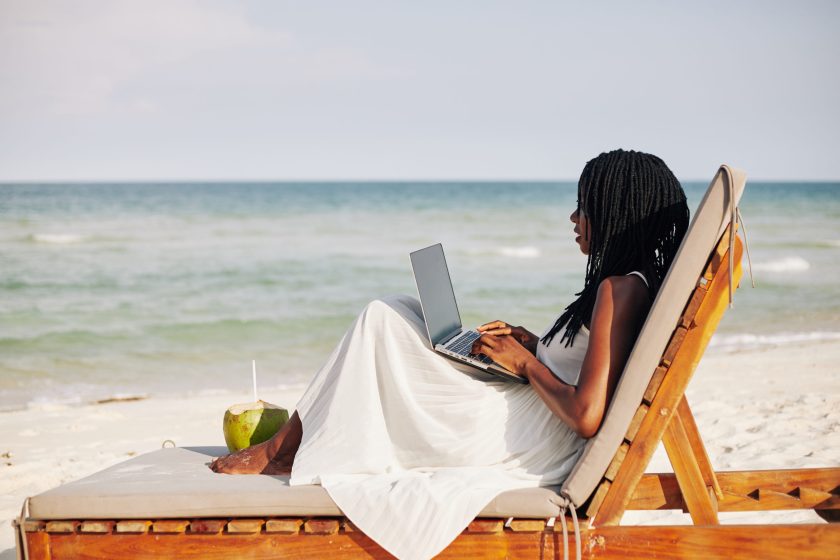
DragonImages via Getty Images
Julie B. Rose
2017 Honda CR-V
How long have you been traveling?
I've been traveling solo full-time with my dog (Penny) since September 2020 — but intermittently since age 17! I've visited all 50 U.S. states and 22 countries... currently I am in Mexico.
What do you do for work?
I have a nomadic lifestyle blog, juliedevivre.com, and I just started mentoring/coaching folks who are interested in pursuing a nomadic lifestyle, downsizing, traveling with a pet, and otherwise changing course. In December of last year, I quit my high-profile remote corporate job so I could focus on growing my blog, which the coaching business has naturally grown out of. I'm currently living on the income I saved while in the workforce, as I explore coaching and some other opportunities that have presented themselves — and I'm very much focused on enjoying my life to the fullest as I travel!
Why did you choose a life on the road, was your transition to the digital nomad lifestyle gradual or was there an event that made you change everything?
A little of both. I had dabbled in the nomadic lifestyle for several years starting in 2017, always temporarily. But my work-from-home job included frequent business travel back and forth from Arizona to California. When the pandemic happened, and business travel stopped, I could finally "work from anywhere." I realized that my house and everything in it would always keep me anchored to a single place — so I sold it all and decided to be full-time nomadic. Ultimately, I wanted wings, not roots.
Have you experienced any downsides to being a digital nomad, and how have you eliminated or minimized them?
There are going to be issues like bad rentals, feeling like you're packing and unpacking all the time, you're constantly watching your budget because cost of living changes as you move around, all the adulting and the errands you still have to do... so you really just need to be adaptable and comfortable with volatility and change. No way of life is perfect, but you just get better at living nomadically the longer you do it.
What do you wish you would have known before becoming a digital nomad?
I can't think of anything I wish I would've known before going nomadic. For me, it was good to learn as you go. But 10 years ago, I do wish I hadn't bought so much stuff!
What is one piece of advice you would give to someone considering becoming a digital nomad?
It's not for everyone. Before you go full-throttle, experiment. You'll discover soon enough if you are called to it full-time. So just give it a try.
Is there anything we missed that you would like to share with our readers?
Remember, nothing is truly irreversible. Just follow your heart! If your heart changes its mind, at least you tried, and there's always a way back. Don't let fear of the unknown dictate your life.
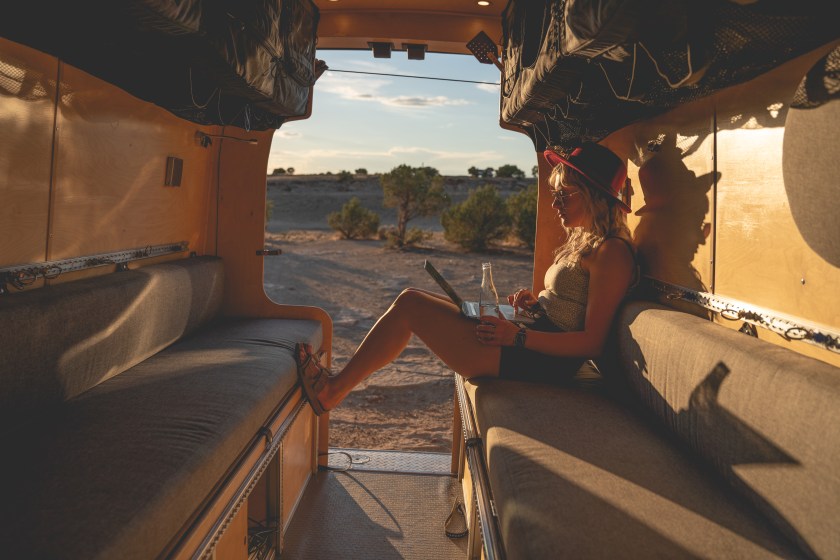
grandriver via Getty Images
Seth & Morgan
Ford Transit 250
How long have you been traveling?
Since November 2021, almost seven months!
What do you do for work?
Seth: I've worked in tech sales for 4 years. Recently transitioned roles while on the road. I'm now in customer success for a social video company.
Morgan: I work in the medical device industry as a patient education specialist, calling and prepping patients for their procedure to receive our device.
Why did you choose a life on the road, was your transition to the digital nomad lifestyle gradual or was there an event that made you change everything?
We were living in Austin paying really expensive rent and traveling every weekend in the winter to ski/snowboard. It was an expensive winter that made us realize that we needed to make a change and luckily, both of our jobs made it easy! So we bought a van that was 90% built out, and we worked on it for about four months to make it our own. Once Eddy was ready to go and our leases ended in Austin, we hit the road and headed west.
Have you experienced any downsides to being a digital nomad, and how have you eliminated or minimized them?
Not having consistent Wi-Fi is probably the hardest part, which meant we had to stay in one place more often than we'd hoped. We are lucky enough to find a great co-working space that was affordable and to have friends all over that we got to spend time with working at their homes. Our friends have been so gracious to us while on the road!
What do you wish you would have known before becoming a digital nomad?
That every day there's a chore to do. Instagram van lifers made it seem so relaxing and carefree... there is zero consistency to living on the road. There is always something needing to be figured out, for example, finding a safe place to park and sleep, where to do laundry, and what pet store sells my dog's food? Stuff like that. We also wish we would have known how hard it is to live in ski towns in the winter! Our water system busted twice, we replaced it twice, and didn't have running water for four months. Having to use gallons of water to brush your teeth, wash your face, do the dishes, etc. gets really old.
What is one piece of advice you would give to someone considering becoming a digital nomad?
Go into it with zero expectations and know that whatever plans you have are most likely going to change. But if you're thinking about doing it, do it! Don't let the unknowns keep you from taking this leap and having the adventure of a lifetime.
Is there anything we missed that you would like to share with our readers?
If you do decide to move your life onto the road, be confident and put yourself out there! Make friends along the way and you will have so much more fun. We've met so many wonderful people that have helped us out in many ways, and we've gotten to be a part of each other's lives as well! Follow along with us @eddy_thevan!

Raised in Butte, Montana, Josh Monthei is a nomadic photographer, skateboarder, and an over-caffeinated writer. He has been traveling North America for over seven years. His travels have spanned over 100,000 miles and include a 3000-mile skateboard trip from Los Angeles to New York City. Instagram: @josh.monthei
Where are your favorite places to skate? Share with us on our Wide Open Roads Facebook!
READ MORE: Choosing the Right Adventure Mobile for Your Nomadic Lifestyle
